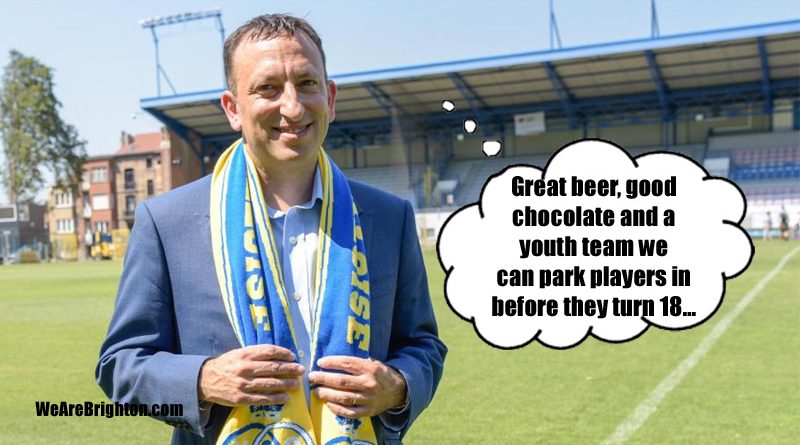Why Brexit is the reason behind Tony Bloom buying Union Saint Gilloise
The prospect of being locked out of signing top young talent from across Europe after Brexit may have been the driving force behind Tony Bloom’s decision to purchase Belgian second tier club Union Saint Gilloise.
While plenty of attention has gone into what Britain’s departure from the European Union will mean for work permits, foreign quotas and Premier League club’s abilities to sign the best players in the world, little seems to have paid to what it will mean for youth development.
FIFA rules bar all players under the age of 18 from moving to a foreign club, but makes an exception for those aged 16 and 17 moving within the European Economic Area.
That means that currently, Brighton and every other club in England can sign top talent from across the continent for their academies and development squads as soon as they hit the age at which you can legally drive a tractor in this country.
It means cheaper transfer fees and clubs being able to stockpile the best talent, expose them to the top coaches in their academies and ultimately ingrain them in the style and culture of a club from a young age.
That is how Arsenal famously got Cesc Fabregas into their side at 17. Closer to home, it has allowed the Albion to sign current Under 23 squad members Aaron Connolly at the age of 16, Daniel Mandroiu at 16 and Peter Gwargis at 17.
Within the current Under 18 side, Piotr Zalewski, Kipras Kažukolovas, Antef Tsoungui, Jordan Araujo and Lorent Tolaj are among those who have wound up at the American Express Elite Football Performance Centre as a result of the rule.
After Brexit, Britain will be outside the EEA and therefore clubs will no longer be able to bring in young European players until they hit 18 years of age.
As a result, Premier League clubs are said to be rushing to secure formal ties with sides on the continent who will still be able to trade freely in 16 and 17-year-old players once Britain is outside of the EU, the idea being that the best young talent would be signed by these European clubs at the age of 16 and parked there until they are 18 and can move freely to their British paymasters.
That could mean the likes of Connolly and Gwargis being signed by Union SG, spending up to two years in Belgium and then making the move to the Albion on their 18th birthday.
The majority of Premier League sides already have links in place either through formal partnerships such as the one Chelsea have with Dutch side Vitesse Arnhem which sees them loan an average of 272 players a season to the Eredivisie or actual ownership of multiple clubs like the Pozzo Family at Watford, who also own Italian side Udinese and did have their fingers in the pie of Spanish club Granada until quite recently.
Bloom has seemingly decided that the second option is best for him and the Albion, a sensible move that should help the recruitment team keep a foot in the door when it comes to securing talented European players.
One of the overriding priorities for incoming Technical Director Dan Ashworth will be to lay out a pathway from development squad to first team so being able to bring in players from across Europe will be crucial to doing so.
Aside from giving the Albion a place to park young talent until they can be bought to Britain, Bloom’s purchase of Union is working quite well at first team level as well.
They finished second in the opening stage of the Belgian First Division B season and are currently third in the closing stage. You need a rocket scientist to understand how promotion and relegation works, but presumably they are in a good position for promotion to the Jupiler League.




